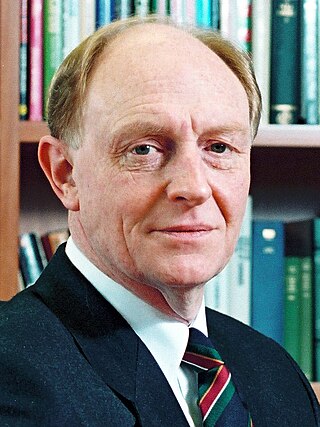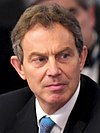
The 1983 United Kingdom general election was held on Thursday 9 June 1983. It gave the Conservative Party under the leadership of Margaret Thatcher the most decisive election victory since that of the Labour Party in 1945, with a majority of 144 seats and the first of two consecutive landslide victories.

The 1987 United Kingdom general election was held on Thursday 11 June 1987, to elect 650 members to the House of Commons. The election was the third consecutive general election victory for the Conservative Party, who won a majority of 102 seats and second landslide under the leadership of Margaret Thatcher, who became the first Prime Minister since the Earl of Liverpool in 1820 to lead a party into three successive electoral victories.
In UK politics, the Parliamentary Labour Party (PLP) is the parliamentary group of the Labour Party in Parliament, i.e. Labour MPs as a collective body. Commentators on the British Constitution sometimes draw a distinction between the Labour Party and the Conservative and Liberal parties. The term Parliamentary Labour Party refers to the party in Parliament, whereas the term Labour Party refers to the entire Labour Party, the parliamentary element of which is the PLP.

Winifred Ann Taylor, Baroness Taylor of Bolton, is a British politician and life peer who served in the Cabinet of the United Kingdom from 1997 to 2001. A member of the Labour Party, she was Member of Parliament (MP) for Bolton West from 1974 to 1983, and Dewsbury from 1987 to 2005.

Angela Evans Smith, Baroness Smith of Basildon is a British politician and life peer serving as Leader of the Opposition in the House of Lords since 2015. A member of the Labour and Co-operative parties, she was Member of Parliament (MP) for Basildon from 1997 to 2010.

Cledwyn Hughes, Baron Cledwyn of Penrhos, was a Welsh Labour Party politician, usually associated with the moderate wing of the party. He was also regarded, particularly in later years, as a non-political figure of stature in Wales having held posts of importance in bodies such as the University of Wales.

A by-election was held in the Bermondsey constituency in South London, on 24 February 1983, following the resignation of Labour MP Bob Mellish. Peter Tatchell stood as the candidate for the Labour Party, and Simon Hughes stood for the Liberal Party. Following a bitter campaign, the Liberals made huge gains and took the seat, with a majority of votes cast. Labour's vote fell from 63.6 per cent in May 1979 to 26.1 per cent as Tatchell came a distant second, while the Conservative candidate, Robert Hughes, managed only fourth place, losing his deposit. With a swing of 44.2%, the 1983 Bermondsey by-election remains the largest by-election swing in British political history.

André Rouvoet is a retired Dutch politician of the Reformatory Political Federation (RPF) party and later the Christian Union (CU) party and jurist. He is the chairman of the executive board of the Healthcare Insurance association (ZN) since 1 February 2012.
The 1983 Labour Party leadership election was an election in the United Kingdom for the leadership of the Labour Party. It occurred when then leader Michael Foot resigned after winning only 209 seats at the 1983 general election, a loss of 60 seats compared to their performance at the previous election four years earlier. This was the worst showing for Labour since 1935 until 2019.

Neil Kinnock was Leader of the Labour Party and Leader of the Opposition from 2 October 1983 to 18 July 1992. He convincingly defeated Roy Hattersley, Eric Heffer, and Peter Shore in the 1983 leadership election, which was prompted by Michael Foot's resignation following the disastrous general election result earlier that year. Kinnock's period as Leader encompassed the bulk of the Thatcher premiership and the first two years of the Major premiership. Kinnock resigned in 1992 after losing his second election as Leader.
Elections to the Labour Party's Shadow Cabinet took place on 4 December 1980, having been delayed due to the October election of new Party Leader Michael Foot. In addition to the 12 members elected, the Leader (Foot), Deputy Leader, Labour Chief Whip, Labour Leader in the House of Lords, and Chairman of the Parliamentary Labour Party were automatically members.

The Social Democratic Party (SDP) was a centrist to centre-left political party in the United Kingdom. The party supported a mixed economy, electoral reform, European integration and a decentralised state while rejecting the possibility of trade unions being overly influential within the industrial sphere. The SDP officially advocated social democracy, but its actual propensity is evaluated as close to social liberalism.
The results of elections to the Labour Party's Shadow Cabinet were announced on 30 October 1985. In addition to the 15 members elected, the Leader, Deputy Leader, Labour Chief Whip, Labour Leader in the House of Lords, and Chairman of the Parliamentary Labour Party were automatically members.
The results of elections to the Labour Party's Shadow Cabinet were announced on 26 October 1984. In addition to the 15 members elected, the Leader, Deputy Leader, Labour Chief Whip, Labour Leader in the House of Lords, and Chairman of the Parliamentary Labour Party were automatically members.
The annual election to the Labour Party's Shadow Cabinet was conducted in October 1986. In addition to the 16 members elected, the Leader, Deputy Leader, Labour Chief Whip, Labour Leader in the House of Lords, and Chairman of the Parliamentary Labour Party were automatically members.
Elections to the Labour Party's Shadow Cabinet occurred in 1953. In addition to the 12 members elected, the Leader, Deputy Leader, Labour Chief Whip, Labour Leader in the House of Lords were automatically members. All incumbent members of the Shadow Cabinet retained their seats.
Elections to the Labour Party's Shadow Cabinet occurred in November 1988. In addition to the 15 members elected, the Leader, Deputy Leader, Labour Chief Whip, Labour Leader in the House of Lords, and Chairman of the Parliamentary Labour Party were automatically members.
Elections to the Labour Party's Shadow Cabinet occurred in November 1989. For these elections the Shadow Cabinet was expanded from 15 to 18 seats and, for the first time, MPs had to cast at least three votes for women.
Elections to the Labour Party's Shadow Cabinet occurred in November 1972. In addition to the 12 members elected, the Leader, Deputy Leader, Labour Chief Whip, Chairman of the Parliamentary Labour Party, Labour Leader in the House of Lords, and Labour Chief Whip in the Lords were automatically members. The Labour Lords elected one further member, Baron Champion.
Elections to the Labour Party's Shadow Cabinet occurred in November 1963. In addition to the 12 members elected, the Leader, Deputy Leader, Labour Chief Whip, Labour Leader in the House of Lords, and Labour Chief Whip in the House of Lords were automatically members.










